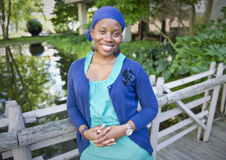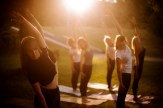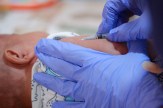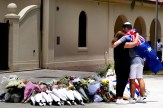Making a global impact on health

As part of a spring semester co-op for the Lance Armstrong Survivorship program at the Dana-Farber Cancer Institute, Northeastern University student Binja Basimike shadowed an oncocardiologist and taught fitness classes for female cancer survivors.
She drew inspiration from the patients. “It’s a pleasure to see how much stronger people become after dealing with adversity and tragedy,” said Basimike.
“Some people have trouble dealing with the small things in life,” she said, “but these people are fighting for their lives.”
The fourth-year health science major will begin classes in Northeastern’s masters of public health program in the fall while continuing in her bachelor’s degree program.
Her co-op experience convinced Basimike to pursue a PhD in international nutrition. Ultimately, she plans to work for an NGO, where she could help shape healthful behavior on a global scale.
“We need to get the right information out there and establish clear guidelines for proper care,” she said. “So many diseases, including HIV and obesity, are preventable by making simple behavioral changes.”
Basimike — who is half Kenyan and half Congolese — caught the humanitarian bug from her father, an epidemiologist for the World Health Organization. He specializes in malaria treatment and prevention in Africa.
As Basimike put it, “I grew up with words like ‘public health,’ ‘malaria’ and ‘zoology’ before I was old enough to go to school. I’ve known that malaria kills nearly one million children under the age of 5 every year since I was pretty young.”
Basimike has also completed three summer internships for health clinics in Africa, which prepared her for working with cancer survivors at Dana-Farber. “The internships were a snapshot,” she said, “but the co-op allowed me to be part of something bigger.”
In June 2010, she volunteered at a health clinic in Durban, South Africa, through Child Family Health International, a global health nonprofit based in San Francisco. There, she learned how to test and counsel HIV-positive patients, including one woman whose husband was unfaithful.
People in Africa view HIV as a death sentence, Basimike said.
“Telling her that she was HIV-positive was one of the hardest things I have ever had to do,” she said. “Looking back on it, the experience allowed me to bring compassion and empathy to cancer patients, which are invaluable qualities one needs when working with cancer survivors. “





